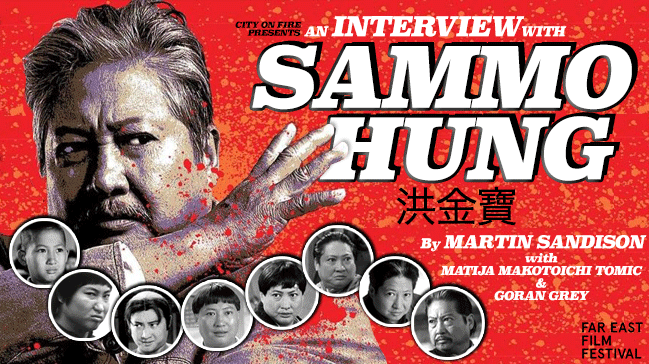If you were to ask me who I thought was the ultimate kung fu filmmaker, one name would instantly spring to my mind: Sammo Hung.
During my childhood, his movies – such as
Prodigal Son,
Warriors Two,
Magnificent Butcher and many others – stoked a fire in my imagination and helped me through some dark times. When I heard he was appearing at the Udine Far East Film Festival in Italy, I immediately thought: “I have to go!” Thanks to my friend Ryan Law and the great staff at the festival, my dream of meeting my personal hero came true.
Sammo was everything I’d hoped he would be: funny, kind, warm and a true gentleman in the purest sense of the word. Despite being in a collective interview, it was an experience words cannot describe. My friends Matija Makotoichi Tomic and Goran Grey managed to get a one-to-one with him, which is also included in this exclusive interview.
Without further ado, here’s the interview for one of the true legends of martial arts cinema.
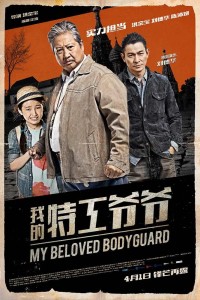
"My Beloved Bodyguard" Chinese Theatrical Poster
TIM YOUNGS: I’d like to welcome our special guest today, Sammo Hung! (audience clapping, cheering)
SAMMO HUNG: Thank you, thank you.
TIM YOUNGS: Sammo’s here to receive the lifetime achievement award for his contributions to Hong Kong cinema over more than 5 decades. He has an incredible filmography, and his first onscreen credit was achieved when he was just a child in 1961.
SAMMO HUNG: (
In English) Me too, I’m a child too. (
audiencelaughter)
TIM YOUNGS: By the late 60’s he had progressed to assistant action director. By the mid to late 1970’s, he had moved in to directing, and that progressed in to a career that became one of making hit films as a director and actor. He was one of the most popular Hong Kong actors since the late 1970’s. Over the years he has had experience in all sorts of genres, from martial arts to horror to modern day action. Now, he is very well known as an action choreographer working on major productions. This year the Far East Film Festival is showing his new film
The Bodyguard. So perhaps you would like to introduce the movie?
SAMMO HUNG: (
In English)
The Bodyguard is a good movie. (
audience laughter) I had stopped being a director for the last 18 years. So I feel like I’m a new director again for
The Bodyguard. I feel like at this point to get a lifetime achievement award is a little bit too early for me. (
audience laughter)
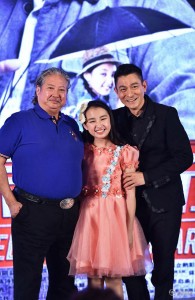
Sammo Hung, Jacqueline Chan and Andy Lau.
Actually, I wanted to be director of this movie. So when the boss showed me the script, I read it and 2 weeks later he asked me: “What do you think?” I said: “It’s a very good script” He said: “Do you have the time?” I said: “Yes”. I have been working in this industry most of my life and it’s very rare to find a really good script. I really love movie making. Acting and directing. However, if you want me to count it, I could only say maybe a handful – like 5 or 6 movies I’ve made – have good scripts. So if I see a movie with a really good script and I wasn’t involved, I feel aggrieved that I wasn’t part of that collaboration. So if there’s a good script and nobody invites me to be involved, that’s very hard, because opportunities are rare to come by. So, in a way, I’m really involved in this movie, I was the director, I was acting in it, I was also the action choreographer and I think I totally invested myself into the whole collaboration and creative side of this movie. When I made
The Bodyguard, I enjoyed everything. In the morning, I enjoyed it. Even when BREAK! GO! I enjoyed it
. (
audience laughter)
TIM YOUNGS: When you first saw the script, was there a specific theme, idea, or concept that appealed to you in particular?
SAMMO HUNG: This is a script that is very strong and complete, and I don’t feel I need to change a lot. I just added my own thoughts and ideas in making the movie.
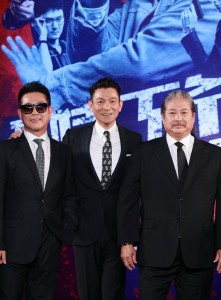
Twinkle Stars reunite: Yuen Biao, Andy Lau and Sammo Hung.
TIM YOUNGS: The film also has different genre types. There’s a lot of drama, there’s a lot of action. It’s an interesting balance. I feel that in a lot of your older films, you like to cross into different types of genres. What appeals to you in that way?
SAMMO HUNG: Before I did everything… horror movies, action movies. Now, I want to try love stories. Before it was just fighting, now I want to try everything. Now, I want to find the new, young action stars. In Hong Kong, it is very difficult, in Mainland China, they have had the chance, but don’t really make kung fu movies. Because before, everybody loved it when I made the kung fu movies. But now, give me a chance to make the love story (
audience laughter).
TIM YOUNGS: Where would you look for the new martial arts talent?
SAMMO HUNG: I will start after June to look for Martial Arts Champions in China, and give them a good chance to join me.
TIM YOUNGS: Now we can jump to the floor: are there any questions for Sammo about his career?
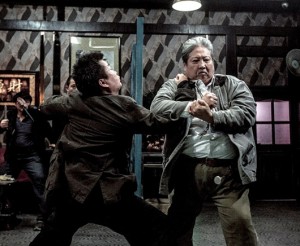
A fight scene from "My Bodyguard"
JOURNALIST: I enjoyed the movie. I think everyone will like it. I’d like to ask you about the Hong Kong movie market. Less and less good movies are made in Hong Kong, and I wanted to ask you what will you do. Will you do something to save the Hong Kong movie market or will you abandon it and move to mainland China?
SAMMO HUNG: Now, the problem is nobody in Hong Kong is making kung fu movies. Even for the last 5 years. There is no training platform for the students. 20 years ago, 30 years ago, they have the training and they thought, with hard work, I can be an action star. Now, we don’t have these kinds of dreamers who want to shoot the movies. This is the problem in Hong Kong. The young kids, they don’t dream. They become waiters. Or they dream of being singers, dancers, and TV is very popular. So they go this way, they don’t think “I need to train hard”.
Mainland China is young in terms of the movie market, and in ten years they have grown up. Sammo Hung, Jackie Chan and Yuen Baio are popular until now. How many new action stars coming up? Only 5 or 6. Now in Mainland China there are kids training… they all know kung fu. So now they need a chance, so we will see the next generation of kung fu movie stars. Immediately, in my mind, I want to establish my own company in Shanghai. I will set up martial arts schools and call all the Martial Arts Champions and students to come. And of course, they will have to love movie making, acting as well.
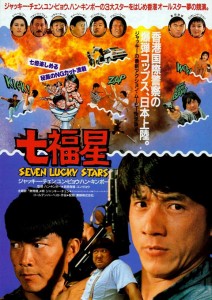
"Twinkle Twinkle Lucky Stars" Japanese Theatrical Poster
I want to create an opportunity for them to train to be kung fu stars. So my next goal is to find the next kung fu actors from China. If I discover these people, they don’t need to only work for me. I will be equally proud and happy if they can become a success in all the areas of movie production. So I will stay behind them and wish them success. I’m not Jackie Chan. Jackie Chan is a hero. In my movies before, you can see there are so many actors, I’m not the top guy. I love movies, I love characters. I love people who can do a good job. They work for me, they don’t work for me, I’m happy. (
audience clapping, cheering)
TIM YOUNGS: I’d just like to extend that a bit. You are obviously very interested in martial arts cinema. How have you seen the market change? In Hong Kong for example, martial arts films haven’t been as popular as they were in the mid-90’s. Is it difficult to find investors to work with new talent?
SAMMO HUNG: First I want to say, in Hong Kong, not only martial arts movies are going down. In the last 7 years, the Hong Kong film market is always going down. To make the drama movie, you need 7 million dollars. For the kung fu movie, you need 12 million dollars. But now in Hong Kong, the market is very low. Before when we start shooting in Hong Kong, they say “Sammo Hung, we have a new movie has started”. And in lots of places like Korea, Thailand, Malaysia they say “Oh, we will buy your movie”. Now they need to see the movie, then they will decide to buy or not. So, if we make the kung fu movies with new guys, nobody wants to buy it. So, you’re asking me when in Hong Kong martial arts movies go up, I really don’t know. And Mainland China, they will put a lot of money in to casting. They don’t know how to push the new people.
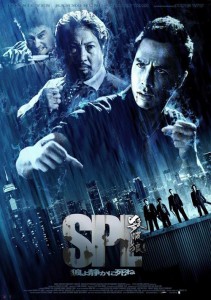
"SPL" Chinese Theatrical Poster
FRED AMBROISINE: I wanted to talk about your career as an actor. You stopped working as an actor in the mid 90’s. And then you played a very important role as an actor in
SPL. This one was important because you played a bad guy, and you hadn’t played that since maybe in the 70’s, where you were fighting Angela Mao Ying. So could you tell me what made you decide to accept this role?
SAMMO HUNG: I don’t normally play bad guys, as you said. Now, it’s a very simple answer, it’s who pays me the most! (
laughter) Joking. I actually examined the script very carefully. I looked at how this character was portrayed, why was he the bad guy, how was he described in his personal life. I Wanted to make sure the audience understood who this bad guy is. Obviously, I didn’t want the role of the bad guy to affect people’s perception of me. So, whether playing a good guy or a bad guy, I want to see that the script has the full character development for me to be a good actor, so that I could use my acting methods to express the character, which will eventually enhance the story telling.
So, for a while I was like Robin Hood. I was always helping people and because a lot of people in the industry are good friends – actors, directors – and they all have interesting projects, and I say: “I have a role for you, come and help me out”. So I was playing Robin Hood for a long time, for a lot of my friends. Just like this movie
The Bodyguard, there are a lot of old friends in it. They just come in one day to shoot. Like Tsui Hark, Karl Maka, Dean Shek. And my Seven Little Fortunes classmate Yuen Baio. So in the industry we really value our old friendships. We all reciprocate this too, and I will never reject them and help them out whenever I can.
http://cityonfire.com/sammo-hung-in...-festival-exclusive-new-the-bodyguard-ip-man/


